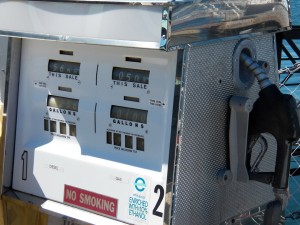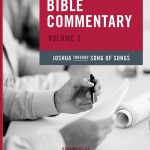
The first time I needed a biblical foundation for my work was when I worked at a racist gas station. I
was in the 12th grade. If you came to our station white, you got full service. We washed your windshield, checked your oil, called you “sir” or “ma’am,” offered you the restroom key. If you came to the station black, we filled your gas. That’s it. No windshield. No oil. No restroom. No “sir.” No “ma’am.”
I felt terrible about it. I had enough biblical foundation to know that treating black people badly was wrong. But I needed the money, so I didn’t quit. The only thing I did was to treat black customers the same way I treated white customers. If you came when I was on duty, I would check your oil, wash your windshield, call you “sir,” or “ma’am.” That’s all I did about racism in my workplace. Looking back, I wish I had done more.
I knew that the Bible was supposed to be my guide in life. But there seemed to be a huge gap between this 2000-3000 year old religious book and the realities I experienced at the gas station. I wish someone had known how to help me find the things in the Bible that could help me at work.
For example, 1 Samuel chapter 25 could have helped me at the gas station. In that chapter, David, who is not yet king of Israel, demands that a landowner named Nabal “donate” a flock of lambs to feed David’s army. Nabal is a hotheaded guy. He gets angry, refuses to donate the lambs, and insults David in front of his troops. David is a hothead too. So he gets 400 soldiers ready to go massacre Nabal and every male in his clan. David is about to commit a kind of mini-genocide, which seems to me like an extreme version of the racism at the gas station I used to work at.
Here’s where it gets interesting. Nabal’s wife, Abigail, rushes out to meet David. She brings her own feast to give his army, and then makes what is probably the most courteous speech in the Bible. But the speech has a punch line, “The Lord restrain you from bloodguilt and from taking vengeance with your own hand…so that [you] shall have no … pangs of conscience, for having shed blood without cause….” A hard message, wrapped in a polite speech. After he hears this speech, David changes his mind and calls off the attack.
In other words, Abigail brings David a present, speaks to him respectfully yet forcefully, and David actually changes his ways. I could have done the same thing at the gas station! Every day I was bringing the owner a present because I was one of only two employees who didn’t steal from the cash register, and the owner knew it and valued it. So some night when I took the cash bag to his house, I could have said:
“John, the reason the money in my cash bag always matches the register tape is exactly the same reason I always treat black people with respect at the pumps. I treat you and your money with respect because it’s in my heart to treat everyone with respect. If you ever want a gas station where every employee treats all your money with respect, maybe you could create an atmosphere where every employee treats all your customers with respect. Just an idea. Have a good night, and I’ll see you at the station tomorrow.”
It never occurred to me to say anything like that. I believe now, that if I had done as Abigail did, the owner would have at least listened to what I said. Who knows, maybe he would even have started changing the culture at the station. Not overnight, but gradually. But I knew nothing of Abigail’s example, and I had no hope that God would be with me if I tried to talk to my boss about an ethical issue. The Bible is a powerful foundation for faith at work if we learn to apply it to work.
Since 2007, I’ve had the privilege of working on the Theology of Work Project with a mission to research and write about what the Bible says about work. Along the way, we’ve been amazed by how much the Bible says about work. Probably everyone interested in faith and work knows some Bible passages related to work, but did you realize that those passages are not rare highlights, but representative samples of the Bible? To put it in biblical words, “The cattle on a thousand hills” are the Lord’s, not just the temple on the hill of Zion. Once I took off my church-polarized lenses, I saw that a lot of the Bible has to do with work.
For example, here are three of my favorite passages about work, which are all relevant to issues we face today.
- In the book of Ruth, a business owner named Boaz figures out how to make a profit while fulfilling his duty to improve life for an immigrant named Ruth and for other vulnerable workers. That is a topic literally right off the pages of the Wall Street Journal 3000 years later.
-

Image via Pixabay CC The Song of Songs is not a book that you usually go to, to find faith at work. Isn’t it basically an erotic love poem? But read it more closely. What are the couple actually doing while reciting love poetry to each other? They are planting a vineyard, and working hard at it. In other words, Song of Songs is about a couple who start a small business as a way to make a living and to strengthen their love. Their work draws them together, rather than keeping them apart. I like this passage because it shows work and family life, not as a balance of competing priorities, but as an integrated way of achieving what is most important in life for these two people. For a modern-day example, see our previous post on Max Schireson, a CEO who stepped down to have more time for his family.
- In 2 Corinthians chapter 6, Paul and the church wrestle with how to be true to Christ while working in a pluralistic society. Two thousand years later, we still face the same challenge.
We found 859 passages of scripture that relate to work in some specific way. Before we started, I would have guessed 50 or 60 passages, not 859. That’s because I used to think the Bible was a book about religion, with a few applications to work. But it’s not. The Bible is a book about God, and it turns out that God shows up where God’s people spend their time, which is mostly at work.
Adapted from a talk by William Messenger (Executive Editor, Theology of Work Project) at the Faith@Work Summit, October 24, 2014. Full essay posted here.













